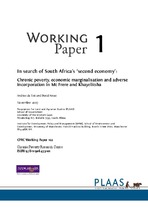| dc.contributor.author | du Toit, Andries | |
| dc.contributor.author | Neves, David | |
| dc.date.accessioned | 2019-03-11T07:36:37Z | |
| dc.date.available | 2019-03-11T07:36:37Z | |
| dc.date.issued | 2007-11 | |
| dc.identifier.citation | du Toit, A., Neves, D. (2007). ‘In search of South Africa’s ‘second economy’: Chronic poverty, economic marginalisation and adverse incorporation in Mt Frere and Khayelitsha’, Working Paper 1. PLAAS, UWC, Cape Town. | en_US |
| dc.identifier.isbn | 978-1-906433-01 | |
| dc.identifier.uri | http://hdl.handle.net/10566/4450 | |
| dc.description.abstract | Since 2003, South African policy discourse about persistent poverty has been
dominated by the notion that poor people stay poor because they are
trapped in a ‘second economy’, disconnected from the mainstream ‘First-
World economy’. This paper considers the adequacy of this notion in the
light of research conducted in 2002 and 2005/06 in Mount Frere in the rural
Eastern Cape, and in Cape Town’s African suburbs. It argues that a process of
simultaneous monetisation, de-agrarianisation and de-industrialisation has
created a heavy reliance on a formal sector in which employment is
becoming increasingly elusive and fragile. Fieldwork suggested high levels of
economic integration, corporate penetration and monetisation, even in the
remote rural Eastern Cape. Rather than being structurally disconnected from
the ‘formal economy’, formal and informal, ‘mainstream’ and marginal
activities are often thoroughly interdependent, supplementing or subsidising
one another in complex ways. The dynamics involved diverge significantly
from those imagined both in ‘second economy’ discourse and in small,
medium and micro enterprise (SMME) policy. Instead of imagining a separate
economic realm, ‘structurally disconnected’ from the ‘first economy,’ it is
more helpful to grasp that the South African economy is both unitary and
heterogeneous, and that people’s prospects are determined by the specific
ways in which their activities are caught up in the complex networks and
circuits of social and economic power. Rather than ‘bringing people into’ the
mainstream economy, policy-makers would do better to strengthen existing
measures to reduce vulnerability, to consider ways of counteracting
disadvantageous power relations within which people are caught, and to
support the livelihood strategies that are found at the margins of the formal
economy. | en_US |
| dc.language.iso | en | en_US |
| dc.publisher | Institute for Poverty, Land and Agrarian Studies, University of the Western Cape | en_US |
| dc.relation.ispartofseries | Working Paper;1 | |
| dc.subject | Eastern Cape | en_US |
| dc.subject | Second economy | en_US |
| dc.subject | Globalisation | en_US |
| dc.subject | Social exclusion | en_US |
| dc.subject | Adverse incorporation | en_US |
| dc.title | In search of South Africa’s ‘second economy’: Chronic poverty, economic marginalisation and adverse incorporation in Mt Frere and Khayelitsha | en_US |
| dc.type | Working Paper | en_US |

